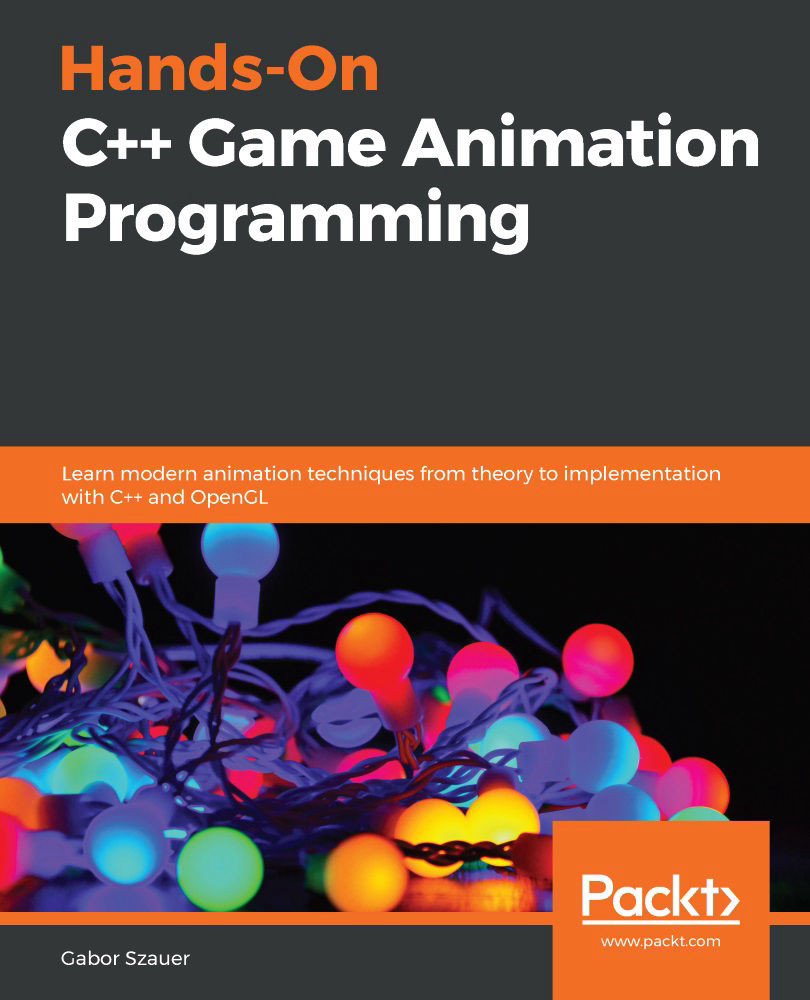To get the most out of this book
To get the most out of this book, some experience with C++ is expected. You don’t have to be a hardened C++ master, but you should be able to debug simple C++ problems. Having some experience with OpenGL is a plus, but not required. No advanced C++ features are used. The provided code compiles against C++ 11 or the most recent version.
The code in this book is written against OpenGL 3.3 Core. The OpenGL code presented in this book is forward compatible; the highest compatible version of OpenGL at the time of publishing is 4.6. In Chapter 6, Building an Abstract Renderer, you will implement a thin abstraction layer on top of OpenGL. Throughout the rest of the book, you will be coding against this abstraction layer, rather than OpenGL directly.
The code presented should compile and run on just about any laptop running Windows 10 or a more recent version. The only hardware requirement to follow along with this book is access to a computer that can run Visual Studio 2019 or a more recent version.
The minimum hardware requirements for Visual Studio 2019 are:
- Windows 10, version 1703 or higher
- 1.8 Ghz or a faster processor
- 2GB of RAM
These requirements can be found online at: https://docs.microsoft.com/en-us/visualstudio/releases/2019/system-requirements
Download the example code files
You can download the example code files for this book from your account at http://www.packt.com. If you purchased this book elsewhere, you can visit http://www.packt.com/support and register to have the files emailed directly to you.
You can download the code files by following these steps:
- Log in or register at http://www.packt.com.
- Select the SUPPORT tab.
- Click on Code Downloads & Errata.
- Enter the name of the book in the Search box and follow the on-screen instructions.
Once the file is downloaded, please make sure that you unzip or extract the folder using the latest version of:
- WinRAR/7-Zip for Windows
- Zipeg/iZip / UnRarX for Mac
- 7-Zip/PeaZip for Linux
The code bundle for the book is also hosted on GitHub at https://github.com/PacktPublishing/Game-Animation-Programming. In case there's an update to the code, it will be updated on the existing GitHub repository.
We also have other code bundles from our rich catalog of books and videos available at https://github.com/PacktPublishing/. Check them out!
Conventions used
There are a number of text conventions used throughout this book.
CodeInText: Indicates code words in text, database table names, folder names, filenames, file extensions, pathnames, dummy URLs, user input, and Twitter handles. For example; "Mount the downloaded WebStorm-10*.dmg disk image file as another disk in your system."
A block of code is set as follows:
public: Pose(); Pose(const Pose& p); Pose& operator=(const Pose& p); Pose(unsigned int numJoints);
Any command-line input or output is written as follows:
# cp /usr/src/asterisk-addons/configs/cdr_mysql.conf.sample /etc/asterisk/cdr_mysql.conf
Bold: Indicates a new term, an important word, or words that you see on the screen, for example, in menus or dialog boxes, also appear in the text like this. For example: "Select System info from the Administration panel."
Note
Warnings or important notes appear like this.
Tips and tricks appear like this.







































































